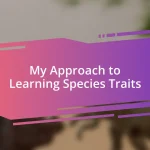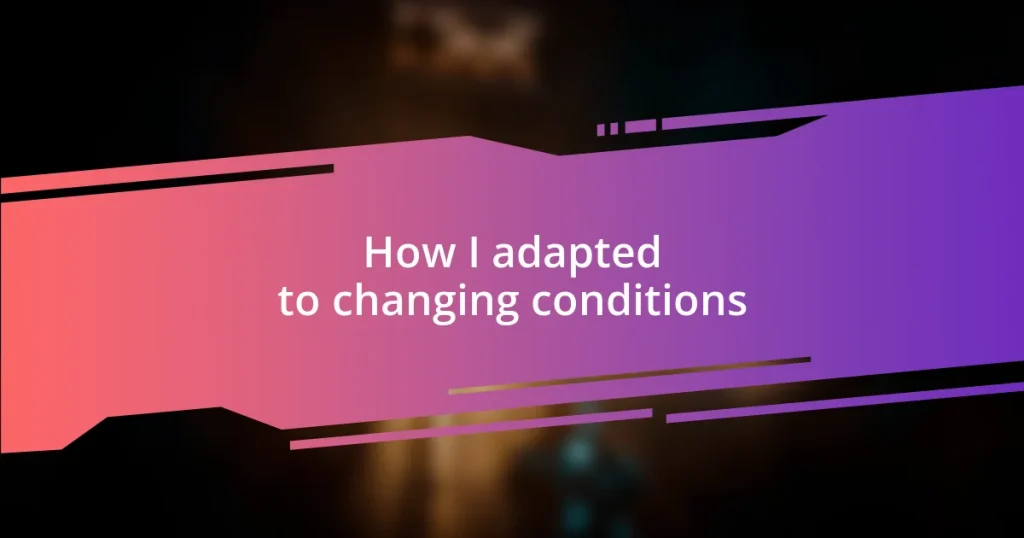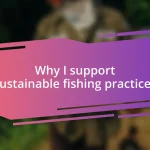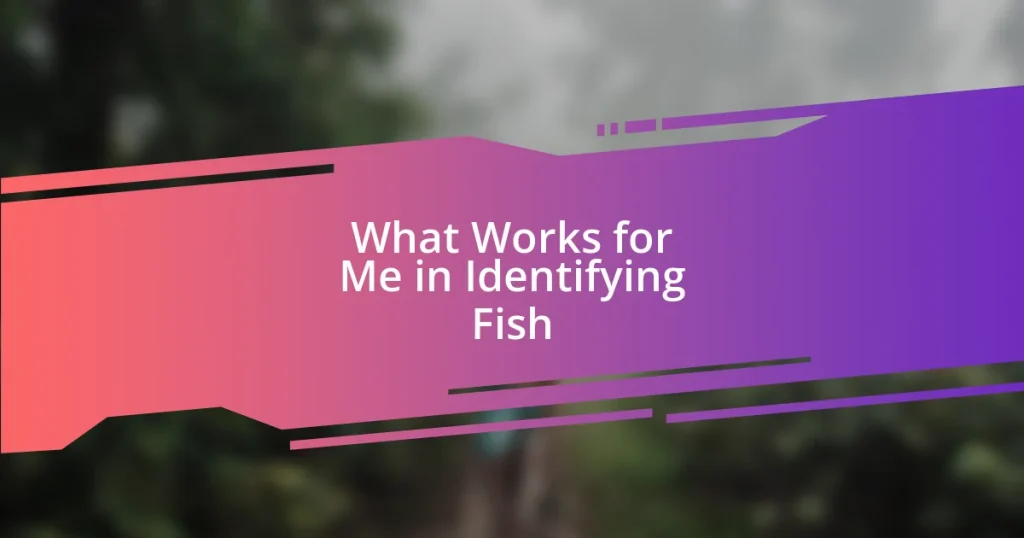Key takeaways:
- Embracing a growth mindset is essential for adapting to change, as it encourages creativity and innovative problem-solving during challenging times.
- Recognizing and leveraging personal strengths, such as resilience and adaptability, fosters confidence and a supportive work environment amidst change.
- Building a strong support network through mentorship and community connections significantly enhances one’s ability to navigate and thrive during periods of uncertainty.
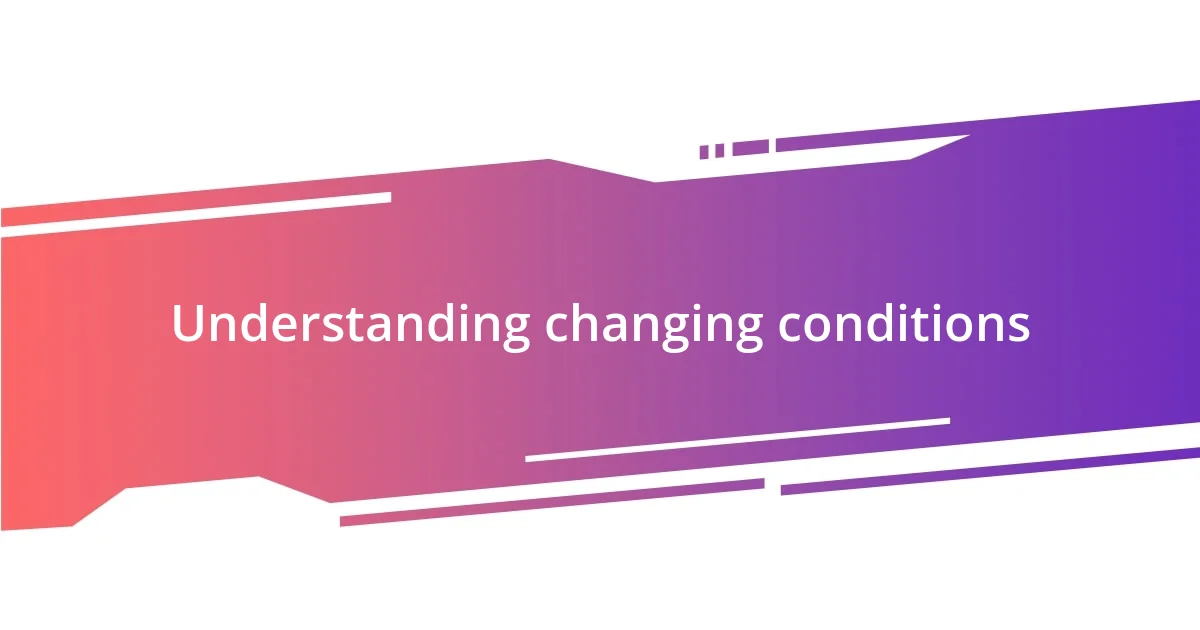
Understanding changing conditions
Changing conditions can often feel overwhelming, can’t they? I remember the time when my work environment shifted to a fully remote setup. Initially, it felt like I was adrift in a sea of uncertainty, grappling with how to maintain productivity and connection with my colleagues.
As I navigated these changes, I began to realize that understanding the nature of change is crucial. For instance, I learned that adaptability isn’t just about responding to external factors; it’s also about adjusting my mindset. A friend once told me, “It’s not what happens to you, but how you respond that matters.” That perspective became a guiding principle for me.
Reflecting on my experiences, I’ve found that the best way to cope with changing conditions is to embrace a growth mindset. Have you ever felt that spark of creativity when faced with a challenge? I certainly did! Finding innovative solutions not only alleviated stress but also ignited a sense of purpose during uncertain times.
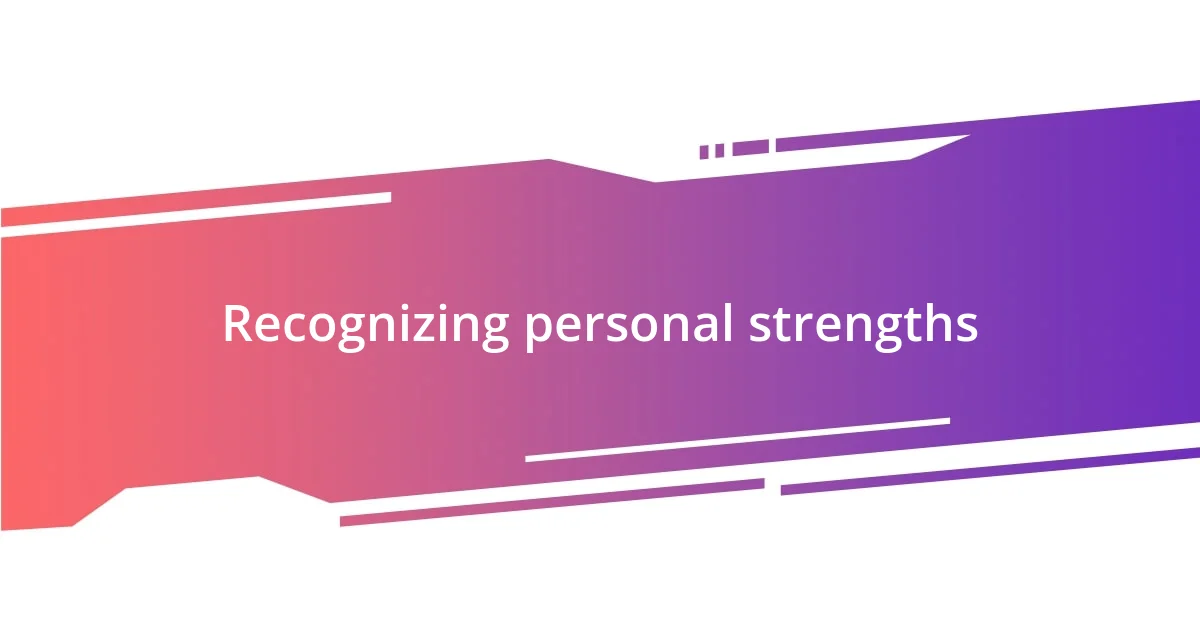
Recognizing personal strengths
Recognizing my personal strengths has been a journey of self-discovery. When my work shifted to a remote setting, I quickly noticed that my ability to communicate clearly became one of my greatest assets. I felt a surge of confidence as I harnessed this strength, reaching out to colleagues regularly to foster connections, even through a screen. That experience taught me that our strengths often shine brightest in challenging times.
Here are some of the strengths I’ve identified in myself that helped during change:
- Resilience: Bouncing back from setbacks became easier as I viewed challenges as opportunities for growth.
- Creativity: I found myself brainstorming unique ways to keep my team engaged, which made work feel more enjoyable.
- Empathy: Understanding my colleagues’ feelings allowed me to offer support, creating a nurturing work environment.
- Adaptability: Embracing change with flexibility allowed me to quickly adjust to new technologies and processes.
- Proactive Communication: Regular check-ins helped maintain team bonding and clarity, preventing isolation even from a distance.
Recognizing these strengths not only provided reassurance during a tumultuous period but also laid the foundation for continuing personal and professional growth.
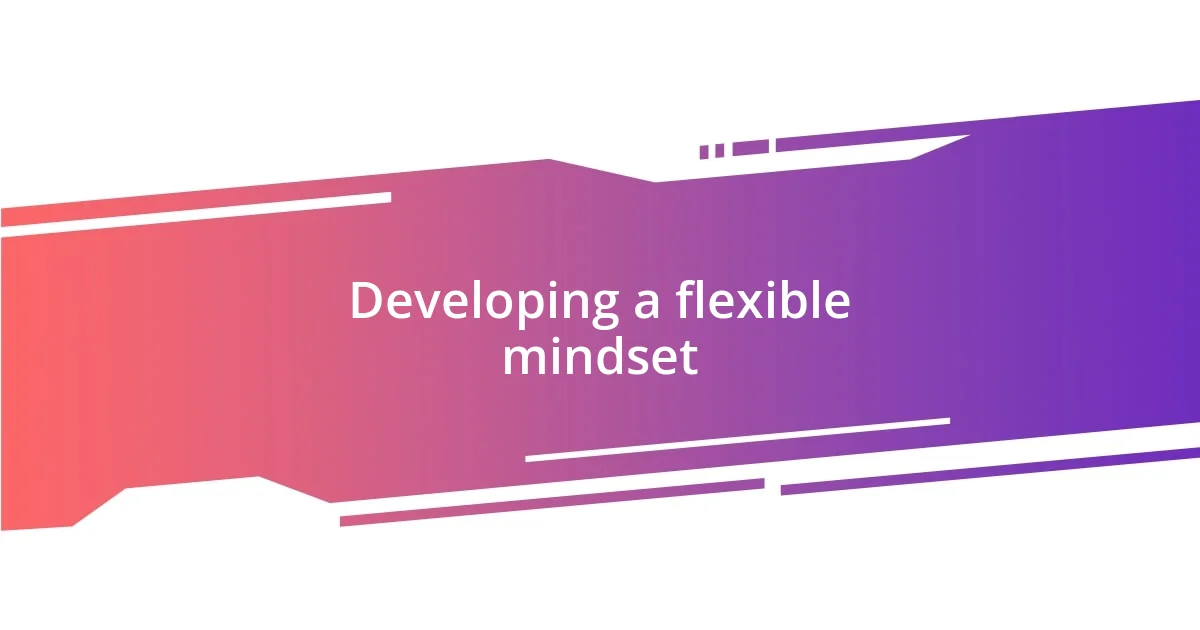
Developing a flexible mindset
Developing a flexible mindset has been a transformative experience for me. I recall a day when I was thrown into chaos with an unexpected project deadline. Instead of succumbing to stress, I paused and reminded myself that flexibility could turn this challenge into an opportunity. I broke the task into manageable parts, allowing me to be adaptable and focus on one step at a time, which made the overwhelming situation feel achievable.
It’s fascinating how our perspectives can shape our reactions. I’ve learned that cultivating a flexible mindset isn’t just about adjusting to change; it’s about embracing it with curiosity and openness. During those uncertain times, I sought out new methods to problem-solve and collaborated with others for fresh insights. For instance, I started a virtual brainstorming session every week, which allowed us to share ideas and support each other through the fluidity of change. This approach not only enhanced our teamwork but also fostered an environment where innovation could thrive.
Engaging with change has taught me the importance of self-compassion. I vividly recall moments when I felt overwhelmed and frustrated. In those instances, I began practicing mindfulness, reminding myself that it’s okay to feel unsettled. Rather than resisting these emotions, I leaned into them and found that they often led me to new realizations. Embracing a flexible mindset means allowing space for both discomfort and growth, ultimately leading to a more resilient approach to life’s curveballs.
| Aspect | Rigid Mindset | Flexible Mindset |
|---|---|---|
| Reaction to Change | Resistant | Embracing |
| Problem-Solving Approach | Sticking to Old Ways | Exploring New Solutions |
| Emotional Response | Overwhelmed | Curious |
| Team Collaboration | Isolated | Engaged |
| Personal Growth | Stagnant | Expansive |
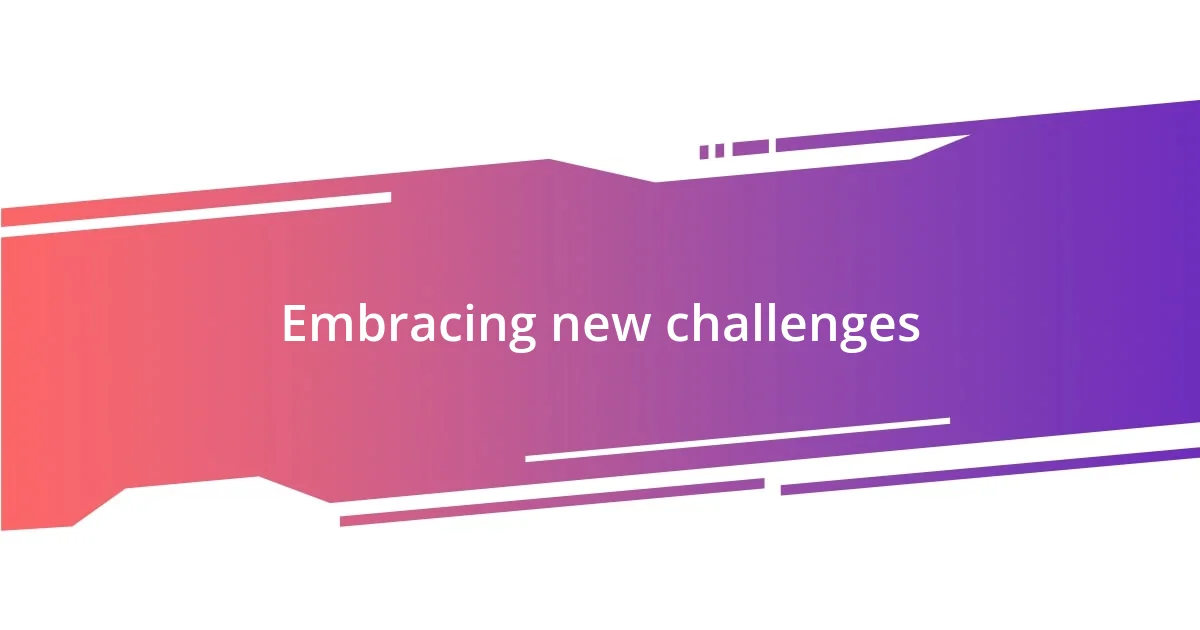
Embracing new challenges
Embracing new challenges has always felt like an invitation for me. I remember when I faced a sudden shift in my role, taking on responsibilities I had never imagined. Initially, my heart raced at the thought, but then I paused and asked myself, “What if this is a chance to learn?” That question opened the door to new skills I hadn’t explored before, making the journey not just daunting but exhilarating.
Each challenge I’ve encountered has brought its own set of lessons. For instance, during a particularly tough project, the team was divided and it felt like we were working in silos. I took the initiative to foster open discussions, and oh, how rewarding that was! It was in those moments that I truly appreciated the strength of collaboration—I saw ideas blossom and spirits lift. How often do we let fear keep us from reaching out? I learned that embracing challenges can transform fear into camaraderie.
I’ve also discovered that embracing challenges allows for a deeper connection with myself. One day, I found myself staring at an overwhelmingly complicated task, and I felt a familiar wave of doubt creep in. Instead of backing down, I reached out for support and actually embraced vulnerability. The relief was palpable, and I realized I wasn’t alone in my struggles. Isn’t it fascinating how sharing our challenges can create bonds rather than walls? Each time I’ve engaged with new hurdles, I’ve found not just growth, but a deeper sense of community and support.
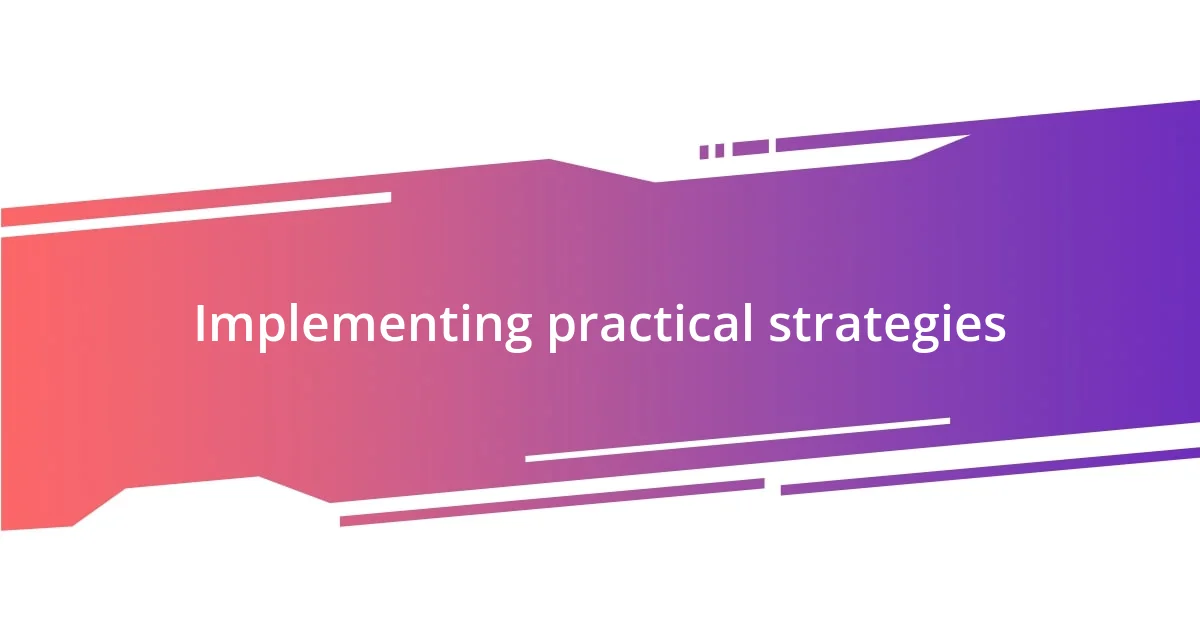
Implementing practical strategies
Implementing practical strategies has been a game-changer for me. One strategy that stood out was my decision to create a daily action plan. I remember some hectic weeks when my tasks seemed insurmountable. By listing out my priorities each morning, I could identify what truly mattered. This clarity helped me feel more in control, and surprisingly, the simple act of writing things down eased my anxiety significantly. Have you ever noticed how visualizing your goals can shift your mindset?
Another approach I adopted was the Pomodoro Technique, where I focused intently for 25 minutes, followed by a five-minute break. This not only refined my productivity but also helped me sidestep burnout. I’ve found that those brief pauses make a world of difference in recharging my creativity. Have you ever felt like stepping away from a challenge revitalized your perspective? I certainly have. It’s incredible how a well-timed break can spark new ideas.
Moreover, surrounding myself with supportive colleagues has proven invaluable. I remember starting a weekly check-in with a mentor, where we shared our wins and setbacks. These conversations have provided me with fresh insights and encouragement that I didn’t know I needed. Engaging regularly with others in this way has reinforced the idea that seeking support isn’t a sign of weakness; it’s an essential strategy for navigating the complexities of change. Have you considered how your network could help you adapt? I encourage you to think about that because sometimes the greatest strategies come from connection.
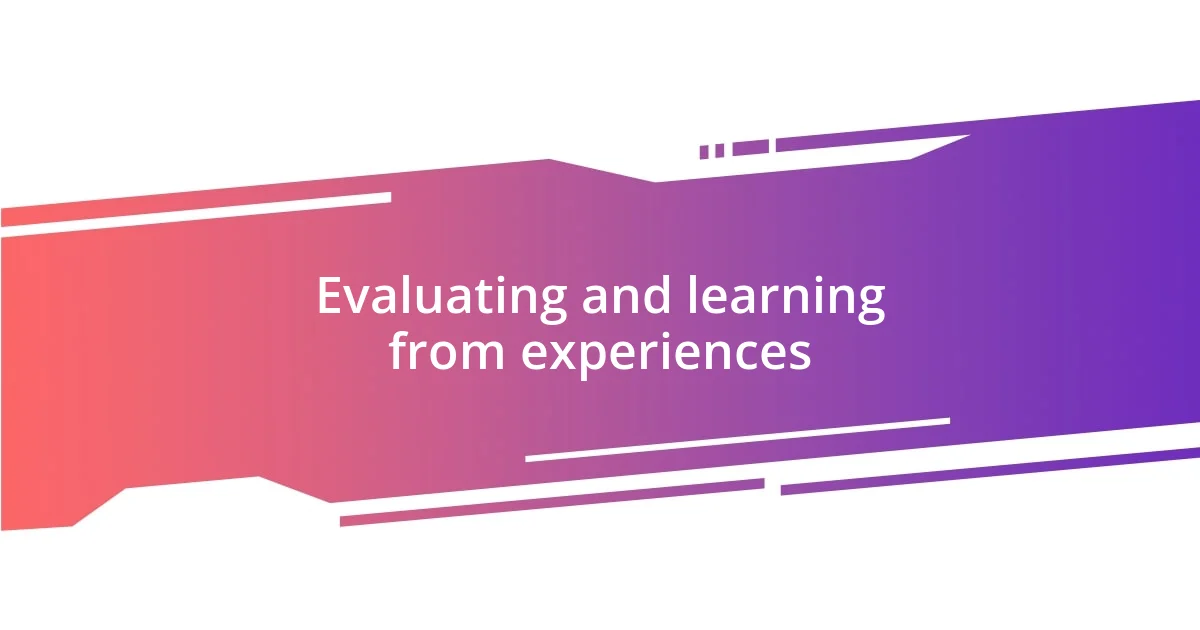
Evaluating and learning from experiences
Reflecting on past experiences is essential for growth. I remember when I completed a challenging project that didn’t go as planned. At the end, I sat down and scribbled my thoughts. What went well? What could I improve next time? This exercise made me realize that even failures hold valuable lessons, like learning the importance of clearer communication. Have you ever taken a moment to debrief after a tough situation? It can be incredibly enlightening.
I’ve also found that feedback—from others or even self-reflection—changes how I evaluate experiences. Recently, after receiving constructive criticism on a presentation I gave, I felt a mix of disappointment and motivation. Instead of being defensive, I took a step back and contemplated the feedback. It pushed me to enhance my skills and reassess how I convey my ideas. This shift in perspective opened doors for improvement that I didn’t see before. Have you ever turned criticism into a stepping stone? It’s a powerful tool!
Lastly, I’ve learned to document my experiences regularly. Every couple of weeks, I jot down my achievements and challenges in a journal. This habit has become a mirror reflecting my growth and adaptation. It’s not just about what I did; it’s about how I felt and what I learned. Sometimes, looking back reminds me how far I’ve come and helps me tackle new changes with confidence. When was the last time you revisited your journey? You might discover more than you think.
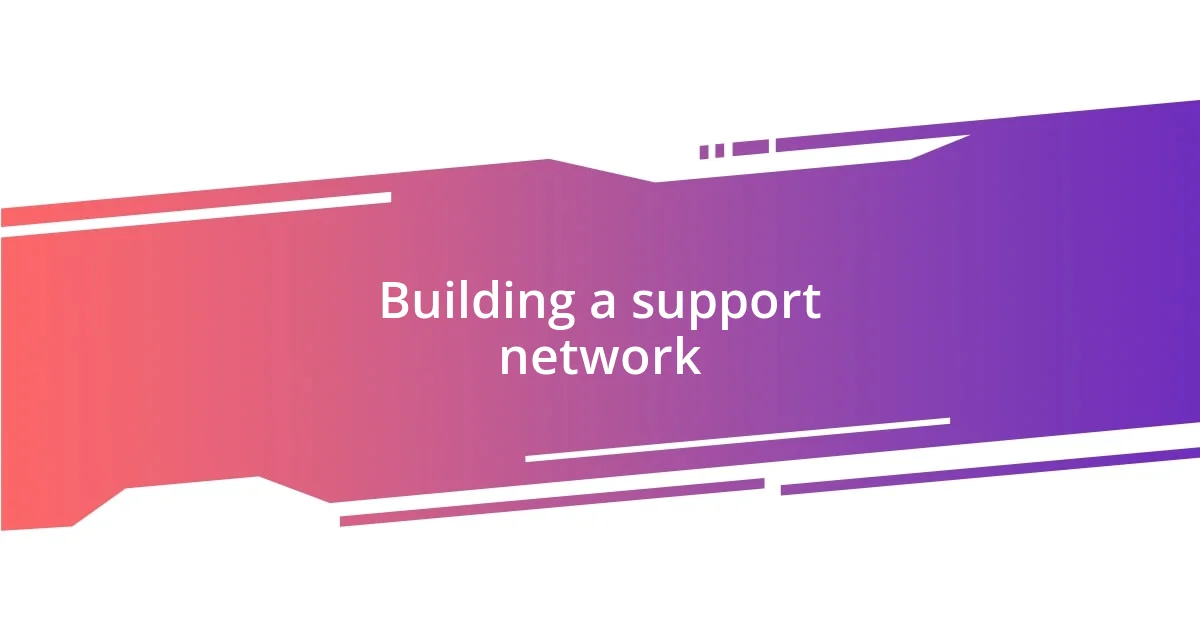
Building a support network
Building a support network has been pivotal in how I’ve adapted to changing conditions. I remember the first time I reached out to an old friend who was going through a similar transition. Just sharing our experiences over coffee felt like lifting a weight off my shoulders. Have you ever found unexpected solace in reconnecting with someone? Sometimes, the most powerful support comes from conversations we didn’t even know we needed.
In my journey, I learned that mentorship can be a game-changer. One evening, after a long day fraught with uncertainty, I reached out to a former supervisor who had always inspired me. That night, we talked for hours about our challenges and aspirations. It was refreshing to draw strength from someone with more experience. Have you identified mentors in your life? Their guidance often provides clarity that we can overlook ourselves.
Moreover, I actively sought out community groups related to my interests. Joining a local workshop on creative writing opened the door to a circle of like-minded individuals. The camaraderie we built not only sparked my passion but also allowed me to share my struggles in a nurturing environment. Isn’t it fascinating how surrounding ourselves with passionate people can ignite our own enthusiasm? These connections have offered both friendship and constructive feedback—an essential ingredient in my ongoing adaptation journey.









